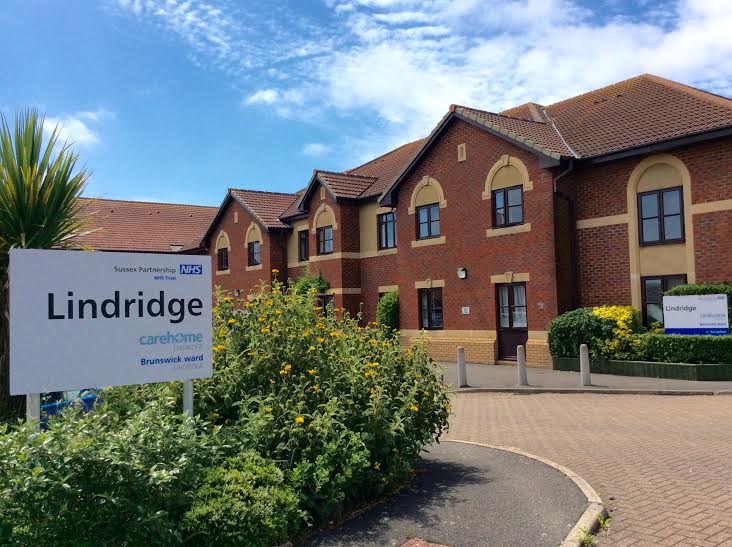A Hove care home “requires improvement”, according to the Care Quality Commission (CQC) in an official inspection report.
Lindridge care home, in Laburnum Avenue, Hove, was rated as good when it came to being caring, responsive and well-led.
But inspectors looked at whether it was safe and effective and found that it “requires improvement” and gave it the same verdict overall.
The home used to be called The Downs and was rescued from closure by Sussex Partnership NHS Foundation Trust when the former owner Southern Cross collapsed in 2011.
The CQC said: “Lindridge is a large residential care home providing care and support for up to 75 people.
“Since the last inspection in May 2014 the home has been through a period of considerable growth and change with an increase in the number of people that can be accommodated from 25 previously to 75.
“This has involved the redesign, extension and refurbishment of the building to accommodate a number of short-term beds for people leaving hospital, as well as a specialist dementia unit and a unit for people with behaviour that can challenge.”
The report also said: “Not all medication practices ensured that medicines were managed safely.
“Medicines that required refrigeration were not always stored within the required temperature range and there was a recording omission … for one person.
“Pain assessment charts held for each person stated the pain-relieving medicines they had been prescribed. Some entries on these did not state a minimal interval between doses, or a maximum daily dose. These instructions are needed to ensure the safe administration of medicines.
“We checked whether staff were working within the principles of the MCA (Mental Capacity Act) and whether conditions or authorisations to deprive a person of their liberty were being met.
“None of the staff members that we spoke with could tell us about the implications of DoLS (deprivation of liberty safeguards) for the people they were supporting. We identified this as an area of practice that needs to improve.
“Staff were able to demonstrate a good understanding of the MCA including the nature and types of consents, people’s right to take risks and the necessity to act in people’s best interests when required. However, they were not consistent in their approach to undertaking ‘best interest’ decisions.
“People were not always consistently supported and monitored where nutritional risks had been identified.

“One person had been assessed by a speech and language therapist (SALT) due to difficulties with swallowing. However, staff were not aware of the identified risks for this person or the SALT guidance regarding positioning, monitoring and advice stating that the person should be supervised when eating.
“This meant that identified risks associated with eating and drinking were not being appropriately managed.
“Throughout the inspection we observed that staff were spending time with people, providing care but also just chatting and keeping people company.
“Staff rotas showed that staffing levels were maintained and we saw evidence that recruitment to vacant posts was in progress.
“People told us that they felt well cared for, that staff were kind and their views were valued, saying: ‘They do treat me with respect and maintain my dignity. They shut the door and pull the curtains before attending to me.’
“Throughout the inspection we saw positive interactions between staff and people with many examples of staff demonstrating that they knew people well and treated them with kindness and compassion.”
The report also quoted one person as saying: “I think it is excellent here, the best care I have had in my life.”
The report added: “Staff told us they were well supported and that opportunities for training and development were good.
“There was a clear management structure and staff told us that the registered manager was approachable and accessible.
“Morale was good and staff told us that they enjoyed their work.
“People told us that they would feel comfortable in raising any issues or complaints with staff or with the registered manager.
“There was a system in place for managing complaints and that the registered manager was proactive in seeking feedback from people and their relatives.
“There were effective monitoring systems in place to check the quality of the service and the registered manager used this information to drive improvements in the service.
“Staff had developed good links within the local community and with health and social care services.”
The report said that the registered manager was Nicola Stevenson and that Sussex Partnership medical director Tim Ojo was the responsible individual.
A Sussex Partnership spokesperson said: “The CQC provides an independent expert assessment of how we are doing, informed by people who use our services. We welcome their feedback and use it to help continue improving.
“Following the inspection by the CQC we have a clear plan in place to address the areas highlighted as requiring improvement, which includes additional training for agency staff to help them safely store and record the medication given to patients.
“We are confident that we can make the changes needed to ensure our services are safe and effective for the people staying with us.
“Since taking over the running of Lindridge we have made significant changes so we were really pleased that the CQC recognised that our services are caring, responsive and well-led and that our staff feel supported.
“It was also important to hear positive experiences from the people being supported at Lindridge as their welfare and wellbeing is at the heart of everything we do.”
To read the report, click here.










